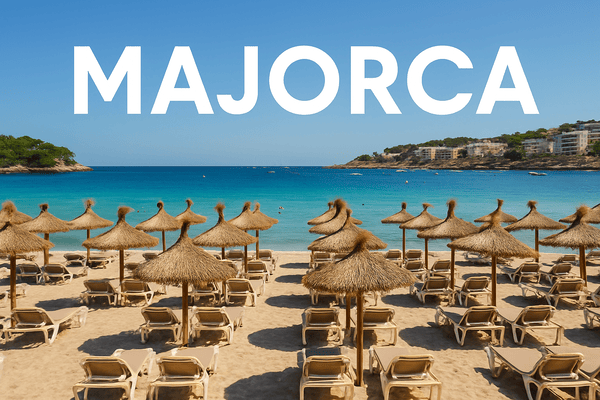As part of an ambitious new environmental and tourism strategy, the Balearic island of Majorca (Mallorca) is planning to eliminate 1,700 sun loungers from its most frequented beaches by 2026. The dramatic move, announced by local officials in response to mounting pressures from both over-tourism and rising sea levels, is set to significantly change the beach-going experience for millions of visitors—particularly British tourists who make up a large portion of the island’s international arrivals.
The Balearics Struggle with Popularity
The Balearic Islands, a picturesque archipelago in the western Mediterranean under Spanish sovereignty, have long been a top choice for tourists seeking sunshine, beaches, and a vibrant holiday culture. In 2024 alone, the region welcomed approximately 15.3 million international visitors—an increase of over 6% compared to the previous year.
Majorca, the largest of the Balearic Islands, remains the crown jewel of the archipelago. British holidaymakers in particular have flocked to destinations like Palma, Magaluf, and Alcúdia for decades. The island’s diverse offerings range from the Gothic architecture and bustling nightlife of Palma to the tranquil beauty of the Serra de Tramuntana mountains and the historic charm of inland towns like Sineu.
However, this growing popularity is not without consequence.
Why Majorca is Scaling Back
Local government officials, backed by community and environmental groups, are sounding the alarm about unsustainable tourism practices that are threatening both the island’s environment and the quality of life for its residents. Overcrowded beaches, congested roads, and strained resources have become all too common during peak tourist months.
More critically, the region is confronting a rising environmental threat: climate change. Rising sea levels and increased erosion are already impacting Majorca’s sandy coastlines. A recent climate resilience report by the Govern de les Illes Balears (Balearic Government) highlighted the urgent need for coastal preservation and more sustainable land use policies.
The planned removal of 1,700 sunbeds—many of which are found on heavily trafficked beaches—aims to give nature more room to breathe. By scaling back infrastructure and reducing daily human impact on the beaches, local authorities hope to mitigate erosion, promote biodiversity, and preserve the island’s natural beauty for future generations.
Impact on British Tourists
With Brits representing one of the largest tourist demographics in Majorca, the change could be particularly noticeable during peak travel seasons. In 2024, more than 3.8 million British travelers visited the Balearics, with Majorca accounting for the lion’s share. Many holidaymakers enjoy the comfort of beach loungers and parasols on the island’s popular shores such as Playa de Palma, Magaluf Beach, and Cala Millor.
The phased removal of these amenities is not meant to discourage tourists, according to officials, but rather to transition toward a more sustainable tourism model. Visitors will still be welcome to bring their own towels, mats, and umbrellas—and the island’s pristine beaches remain as alluring as ever.
Local tour operators, while initially concerned, are also adapting. Many are updating travel advisories and revising their promotional material to reflect the shift. Several resorts have expressed interest in supporting eco-friendly beach activities, such as guided nature walks and marine education programs, to replace some of the infrastructure-focused experiences.
A Broader Sustainable Shift
This sunbed reduction is just one part of a wider set of sustainability measures being considered or implemented across the Balearic Islands. In recent years, the regional government has introduced visitor caps in natural parks, limited cruise ship arrivals in Palma, and increased investments in public transport and renewable energy.
Additionally, local officials are working on educational campaigns to promote responsible tourism, urging visitors to respect local customs, protect the environment, and engage with the region’s culture in a more meaningful way.
Meanwhile, grassroots movements on the island continue to call for stricter limits on mass tourism. Signs reading “Tourism Kills the Island” have appeared in Palma and other cities, underscoring local sentiment that change is not only necessary—but overdue.
Reaction from Locals and Industry
Many residents have praised the decision, viewing it as a necessary step to reclaim their coastal spaces and protect the environment. Environmental groups like GOB Mallorca have publicly supported the initiative, saying it aligns with long-term goals of coastal conservation and marine protection.
The tourism sector, while acknowledging potential short-term disruptions, largely supports the shift toward sustainability. “We must strike a balance between economic prosperity and ecological preservation,” said Maria Rodríguez, a spokesperson for a local hotel association. “Majorca’s long-term success depends on maintaining the natural beauty that draws visitors here in the first place.”
The Future of Majorca’s Beaches
By 2026, the beach experience in Majorca may look different—less crowded, more natural, and better aligned with environmental needs. British tourists planning a visit in the coming years are encouraged to embrace the island’s evolving identity: one that values sustainability, environmental stewardship, and authentic cultural engagement.
As global travel trends shift toward responsible tourism, Majorca is positioning itself as a leader in the movement—redefining what a Mediterranean beach holiday can look like in a world shaped by climate awareness and ecological responsibility.
For now, one thing remains clear: the golden sands of Majorca will still welcome millions, but with fewer plastic loungers and more room for nature to thrive.
For more travel news like this, keep reading Global Travel Wire


















